Has your energetic feline become a perpetual napping machine? If your hyperthyroid cat sleeps a lot, that should raise red flags. It may just be one of the tell-tale signs of hyperthyroidism, one of the common health problems in older cats. Excessive sleepiness is a very strong indicator, but it most often goes with other changes, such as rising hunger with weight loss and excessive thirst. Knowing the signs of hyperthyroidism and getting a proper diagnosis and treatment plans can make a huge difference in restorative health for your cat.
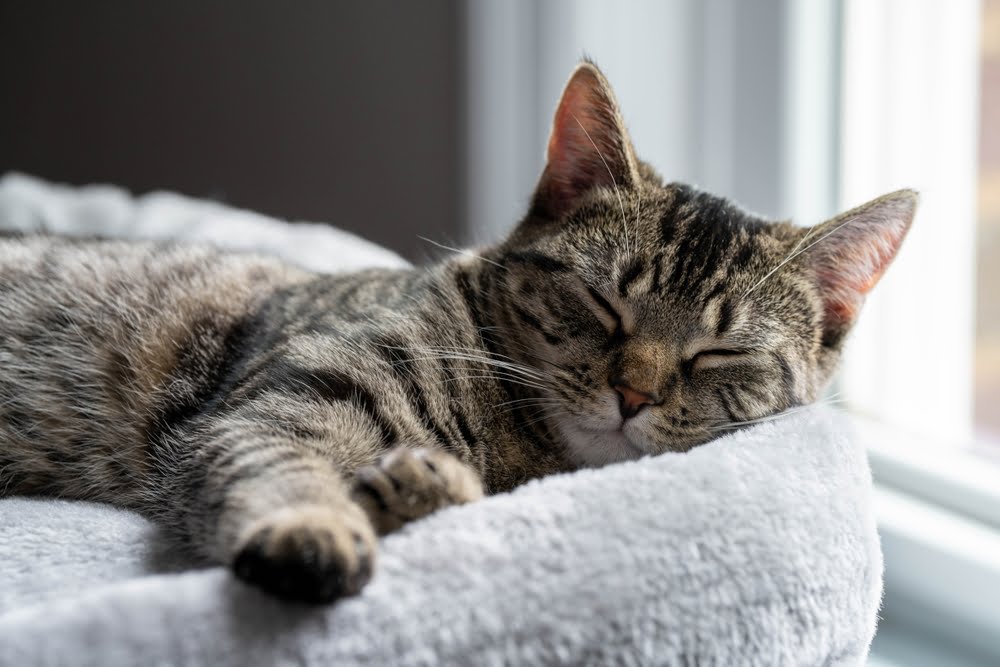
Let us look into the world of hyperthyroidism, causes, consequences, and management strategies. Equipped with proper knowledge, you will be able to see your beloved companion restored back to his zest for life.
What is Hyperthyroidism?
Is your once playful purr machine now spending most of its day in dreamland? Again, while many associate the term hyperthyroidism with excessive energy and restlessness, it is very important to note that this is not always the case. A hyperthyroid cat sleeps a lot—it’s just as concerning as the overly active one. This is a condition in which the thyroid gland produces too much of the thyroid hormones, which control important body functions like metabolism and energy. Besides the two most common symptoms, such as increased appetite and weight loss, it can manifest in some very surprising ways, like unusual lethargy.
Hyperthyroidism in Cat
The most common cat disorders in old age are those caused by an overproduction of thyroid hormones. Probably one of the easiest signs to recognize is a change in sleep pattern. A hyperthyroid cat sleeps a lot more than usual. This is sometimes even to the extent of them appearing really lethargic or uninterested in their surroundings. Other common signs and symptoms include rised hunger, weight loss, increased thirst, and increased urination.
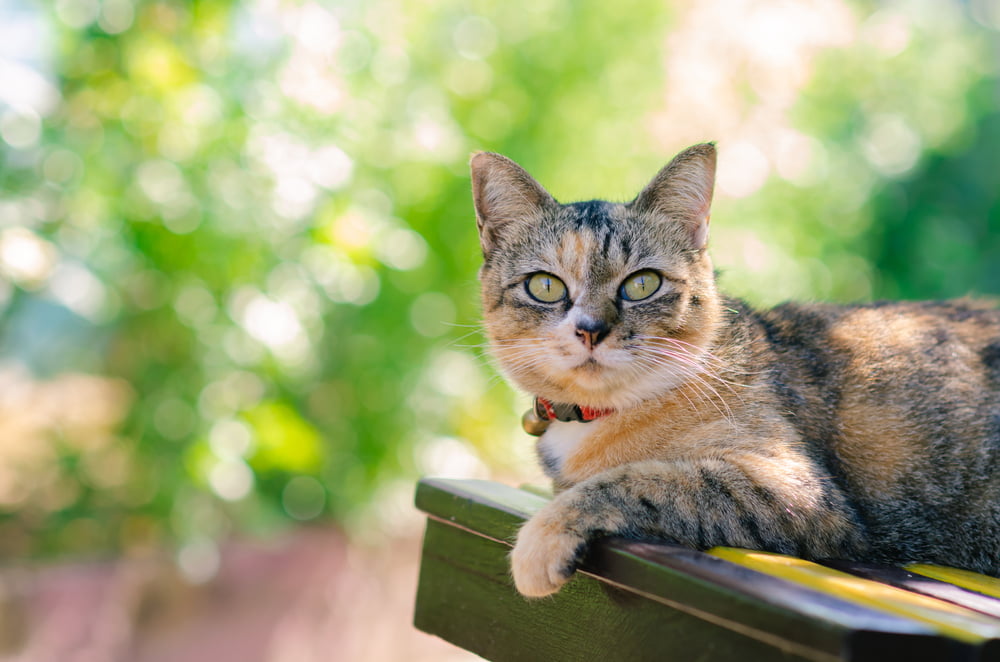
Diagnosis will be made by your veterinarian with a physical examination, blood tests, and probably ultrasonography or fine-needle aspiration of the thyroid gland. Treatment will depend on the severity of the condition and can include medication, radioactive iodine therapy, or surgical intervention. Early diagnosis of hyperthyroidism takes much into consideration regarding the management of the cat’s condition and improvement in life quality.
Common Hyperthyroidism Symptoms
This can be manifested in a number of ways that may at no point turn out obvious. A common sign, which often catches owners off guard, includes a change in sleep patterns. If your hyperthyroid cat sleeps a lot, that would be one symptom.
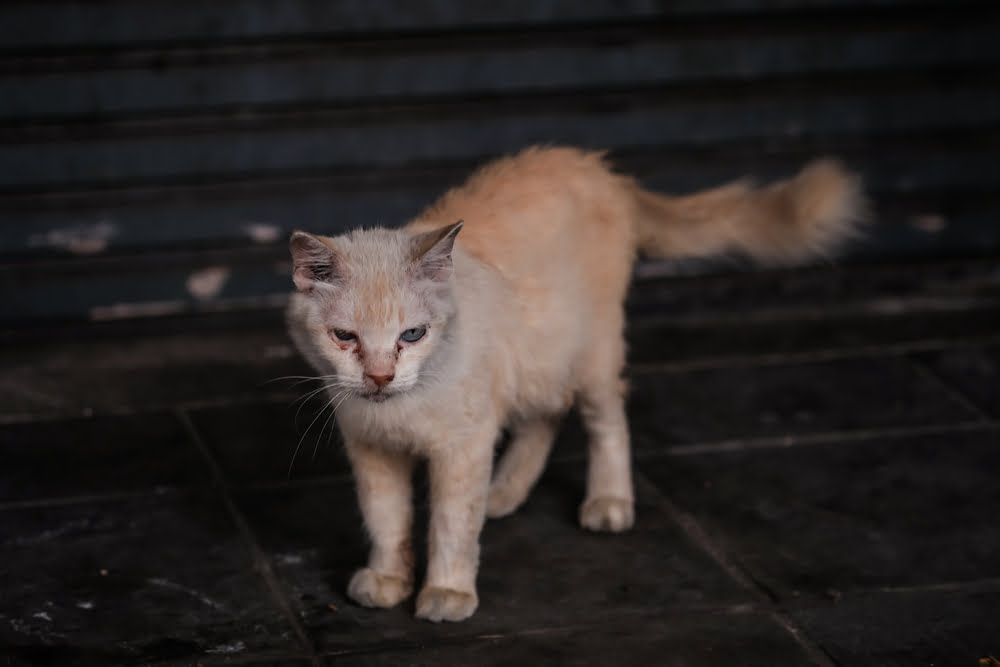
Other noticeable signs include increased appetite despite loss of weight, over-grooming leading to hair loss, and increased thirst and urination. Your cat can also display hyperactivity, restlessness, or suddenly become fearful. Modifications in bowel movement, such as frequent diarrhea, are also standard.
The important thing is that these symptoms can also masquerade as other health problems. If you feel that your feline pet might be suffering from hyperthyroidism, then take them in for a visit to the vet for a proper diagnosis. Since early detection and treatment are two of the most important things related to this condition, it’s important not to wait if your cat is showing symptoms of the disease.
Why Hyperthyroid Cat Sleeps a Lot?
Hyperthyroidism represents a quite common endocrine disorder in cats, mostly affecting older individuals. It results from an overproduction of thyroid hormones. It’s increasing the metabolic rate. Intuitively, one would expect a cat suffering from hyperthyroidism to be very active. It is not uncommon to observe that a hyperthyroid cat sleeps a lot. This paradoxical behavior can be attributed to a number of more fundamental factors concerned with the disease and its effects on the general health of the cat.
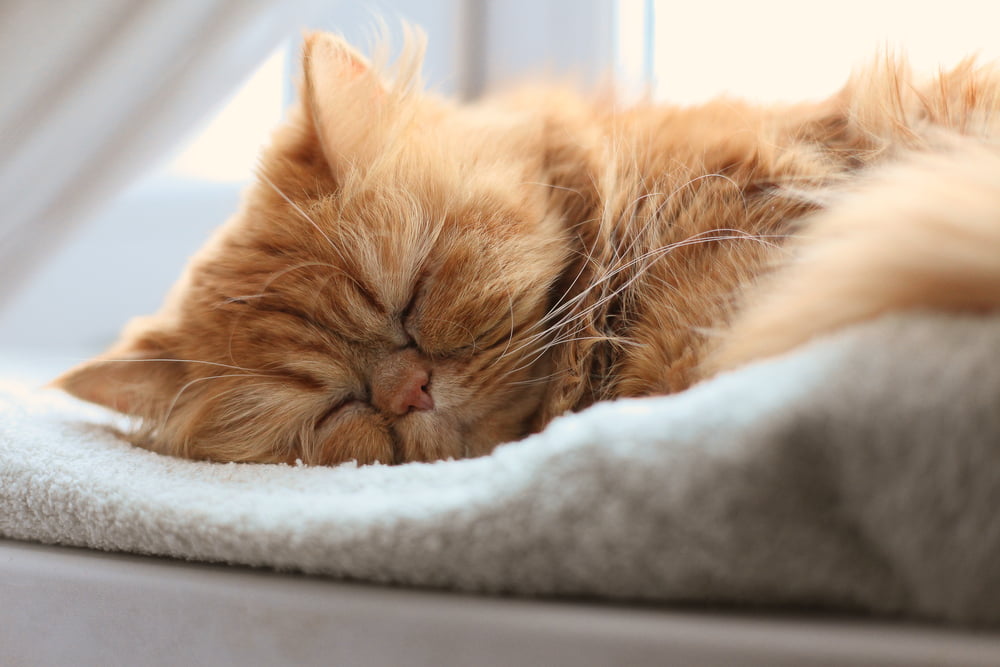
The excess thyroid hormones keep the body of the hyperthyroid cat under constant stress, and this can cause increased fatigue. The heart rate, blood pressure, and nervous system are stimulated by over-activity. So there is a high expenditure of energy even when at rest. This can be very tiring for the cat. In an attempt to conserve as much energy as possible to meet the significantly increased metabolic demands, they sleep more than usual. In addition, the muscle wasting and loss of weight that commonly accompany hyperthyroidism in cats also mean that they are lethargic and need to sleep more.
The sleeping quality of hyperthyroid cats may be affected. Symptoms such as increased thirst and urination can lead to frequent awakening during the night, resulting in fragmented sleep. A cat may compensate for a lack of restful sleep at night with more naps during the day. If a hyperthyroid cat sleeps a lot, it would be indicative that the condition is progressive, and the systemic effects are of a magnitude that warrants seeking a veterinarian for evaluation and a proper treatment plan.
Diagnosis & Treatment of Hyperthyroid Cat
Hyperthyroidism is a very common condition in cats. It is when a lot of thyroid hormones are produced by the thyroid gland. The symptoms may vary but usually include increased appetite, weight loss, hyperactivity, vomiting, and increased drinking. If not treated, this condition can really cause harmful complications, such as heart disease and kidney failure.
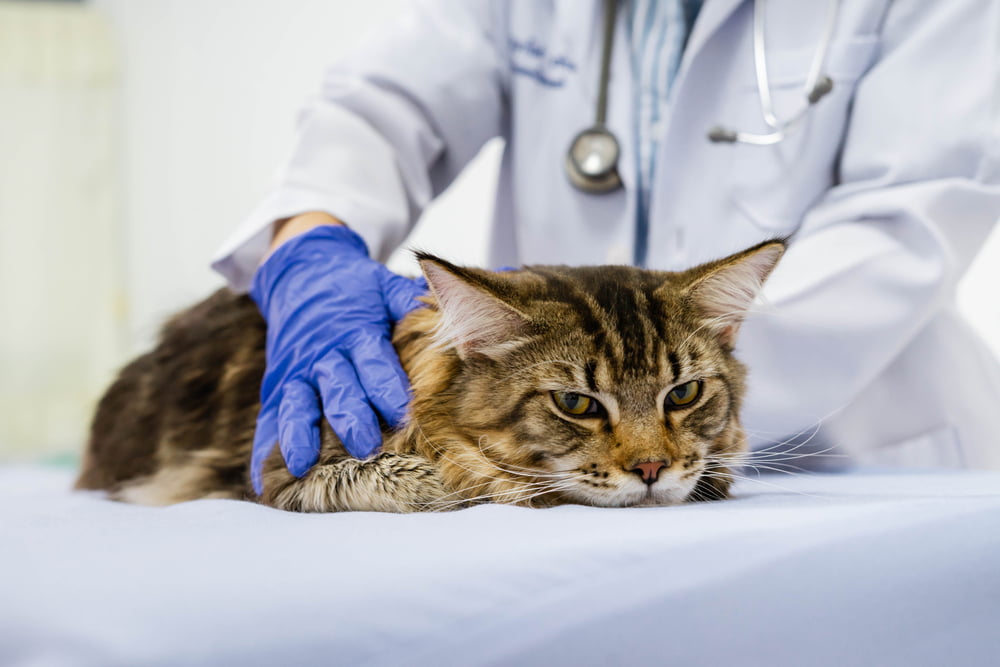
Proper diagnosis and treatment of hyperthyroidism are done through an in-depth approach. Such is the identification of the signs of the condition, diagnostic tests intended to confirm the diagnosis or exploration of different modes of treatment that handle the disease in a proper manner.
✅ Diagnostic Testing
A veterinarian will run a combination of diagnostic tests if hyperthyroidism is suspected, to confirm its presence and eliminate other possibilities. Such tests usually include.
➡️ Physical Examination
The checking of an enlarged thyroid gland and other physical signs.
➡️Blood Tests
Measurements of the amount of thyroid hormones, particularly Total T4 and Free T4.
➡️ Complete Blood Count (CBC)
This means assessment of general health, ruling out other conditions.
➡️Urinalysis
This shall be done to evaluate the functional capacity of the kidneys and hydration status.
Imaging tests might be ordered, which should include ultrasound or scintigraphy, to visualize the thyroid gland. These tests finally confirm the diagnosis and help in the formulation of a proper treatment plan.
✅ Focused Treatment Options
Treatment of feline hyperthyroidism would primarily be based on the management of an overactive thyroid along with all its associated consequences. The significant treatment options include.
➡️ Anti-thyroid Drugs
This group of medications includes Methimazole; however, these medications may only control the production of thyroid hormones.
➡️ Radioactive Iodine Therapy
This is a single treatment that will kill only the overactive thyroid tissue. It destroys the thyroid tumor and cures hyperthyroidism completely. Also, radio-iodine treatment is painless and permanent.
➡️ Dietary Treatment
Some cat foods have very low levels of iodine, which could help control the amount of thyroid hormones. Generally, cats are fed 3 types of food. Dry cat food, wet cat food, and raw cat food. Taking care of the cat’s health and feeding them regularly can ensure their well-being.
➡️ Surgical
Thyroidectomy, where the affected thyroid gland or glands are removed. Abnormal tissue can be removed through this surgery and histopathology is also allowed. Preferred for cats that are difficult to medicate or cannot tolerate medication side effects.
Each treatment option has its benefits and risks, which should be taken into consideration regarding the cat’s general health, age, and the preferences of the owner.
Best Hyperthyroid Cat Care
While an autoimmune disease like hyperthyroidism may be trying for the cat, it is even more so for the owner. Proper care and attention can significantly improve your cat’s quality of life. The following guide shall give you very essential information on managing your hyperthyroid cat.
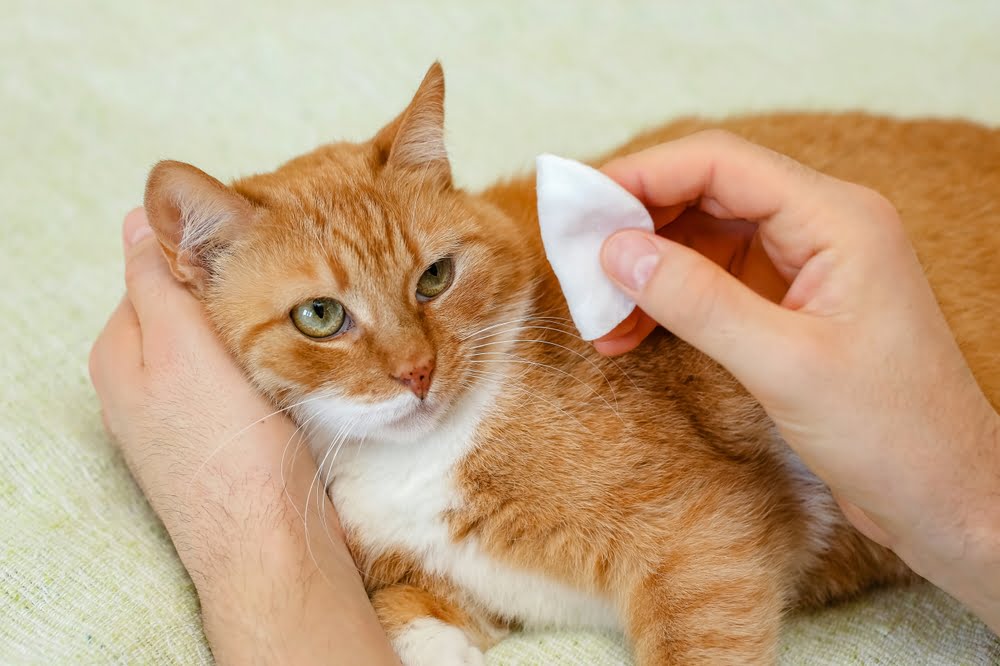
✅ Important Advice for Cat Owners
Regular visits to the veterinarian can help keep a tab on the cat’s condition and thus alter the course of treatment, if necessary. Drugs should be given strictly to control hyperthyroidism. Watch for any side effects of medications, and inform your vet if you have observed any behavioral or health changes in your cat.
This will keep him calm, which is good for a hyperthyroid cat. Regular exercise will keep your cat fit and thus at a good weight. Attention to dental hygiene is always important, but more so in a cat known to have an underlying health issue.
✅ Supporting Diet for Cat’s Recovery
Healthy cat food that’s suitable for your cat’s needs is very important. Your vet will be able to advise you about the best diet for your hyperthyroid cat. Feeding smaller amounts more frequently can be useful in avoiding large swings in blood sugar levels. Absolutely no rich treats are allowed, as these will only increase weight and feed hyperthyroidism. Monitor how much your cat is eating to ensure he is getting enough but not too much.
✅ Creating a Comfort Zone
Reserve some nice & quiet places in your house where your cat can rest undisturbed. The discomfort that comes with hyperthyroidism can be alleviated by providing a warm, cozy, and comfortable area. Play and interactive toys that stimulate gently are excellent components of maintaining your cat’s mental and physical fitness. Regular grooming minimizes stress and maximum relaxation.
✅ Regular Check-ups & Tracking Progress
Keeping a log of symptoms is quite instrumental in follow-up on your cat’s progress. Follow-up to the veterinary clinic is continuous due to the need for readjusting treatment according to the response your cat is showing and early identification of complications. You should discuss open options with your veterinarian so that you have the best plan for your cat. Early identification of complications allows for early intervention, thereby preventing further health problems.
Remember, every cat is different. The best course of treatment depends upon the needs of each individual cat. Careful monitoring, patience, and a good relationship between the cat owner and veterinarian are the keys to success during the treatment of a cat with hyperthyroidism in managing this important endocrine disorder.
FAQ
Are Hyperthyroid Cats Always Hungry?
Yes, many cats with hyperthyroidism are hungry due to an increased metabolic rate that makes them burn energy so fast. As a result, this raises their appetite, making them eat more yet still lose weight. In case you notice this symptom, consult with your vet for proper diagnosis and treatment.
How to Fatten a Hyperthyroid Cat?
Gaining weight for these hyperthyroid cats had always been a huge matter of concern because of their boosted metabolism. Make sure to follow the advice of a veterinarian about a high-calorie, protein-rich diet; otherwise, small consecutive meals can help quite a bit. Adding wet food may add calories. Regular check-ups are crucial for monitoring weight gain and adjusting the treatment if necessary.
Which Foods Help Reduce Hyperthyroidism?
There is no specific food that will directly reduce hyperthyroidism. Nevertheless, diet does have a role in management. The addition of high-quality and protein-rich food helps in preserving muscles and energy levels. Some vets recommend prescription diets low in iodine because it is part of the process of production of thyroid hormone. It’s very important to discuss your cat’s specific needs and conditions with your vet to get personalized dietary recommendations.
Can Hyperthyroidism Cats Drink Milk?
While this does sound like a tasty treat, most cats are lactose intolerant as adults. Milk can upset digestion—diarrhea and vomiting. Moreover, some cats that develop hyperthyroidism must be on a special diet where the amounts of iodine are severely restricted, and milk would interfere with that. Following the vet-recommended diet will keep your cat’s condition in check.
Should Cats Drink More Water During Hyperthyroidism?
Increased thirst is a common symptom because an overactive thyroid results in increased metabolism and activity in the kidneys. This will increase the urination rate of the cat, so they will become thirstier. Providing fresh, clean water and encouraging hydration is necessary for overall good health.
It’s time to Reclaim Your Feline’s Energy
A hyperthyroid cat sleeps a lot due to increased metabolism. Proper treatment brings them back to all their playful glory properly and beautifully. Regular check-ups with the vet, proper diet, and a low-stress lifestyle come in handy here. Watch out for side effects from medication and provide opportunities for gentle exercise. With time, they will again gain the energy to live life more qualitatively. Keep in mind that every cat is different, so customizing a treatment and caring plan with your vet would be a good idea for your pet.

Commitment and proper guidance can make immense improvements in the quality of life for your hyperthyroid cat. You will then get to see the energetic character of your cat. In a way, this is going to be very rewarding both for you and your cat to regain their energetic personality.
Further Reading
A cat lover in need of inspiration for pampering your perfect companion?
Discover all the professional tips and tricks for really making a difference in your cat’s life right here. Start with these must-read articles:
● What Foods Can Cats Not Eat: Protecting Your Cat from Harm
● What Do Cats Love to Eat? An Insightful Guide for Cat Owners
